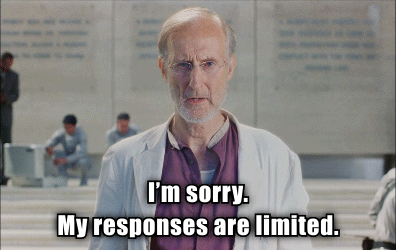
Technology is taking over our workplaces. Should we be scared?
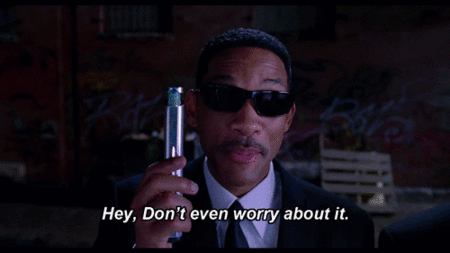
Technology, to economists, is anything that helps us produce things faster, better or cheaper.
Technology has been shaping our workplace for pretty much all of human history. From the time the first prehistoric humans picked up sticks and stones to make tools, we've used technology to help us meet our daily needs.
But these days, workplace technology is more complex, more clever and - for some people - more out of control than ever before. From recruitment software that judges candidates by their micro expressions to injecting employees with microchips, modern workplace software can change the way people work in amazing - and terrifying - ways.
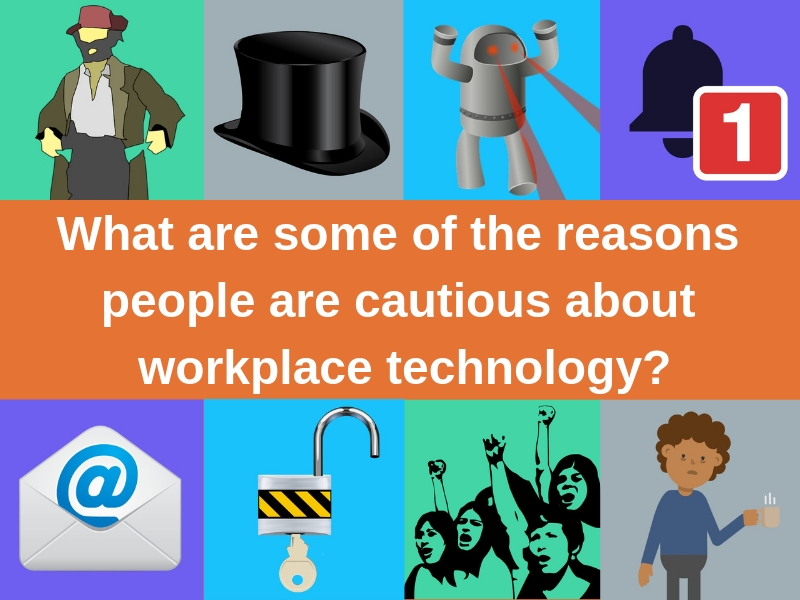
Replace human workers
Technology has proven itself to do things cheaper and quicker than humans. They also don't get sick or take time off. So businesses driven by cost savings have an incentive to replace their staff with tech. (Think of self-checkout machines at supermarkets). Some people think more and more jobs are about to be automated, leading to "widespread unemployment".
Invade our privacy
Technology like CCTV cameras and keystroke loggers can record lots of data on staff. (Even personal devices and accounts can be accessed via work computers or wifi.) Not only do some people find this sort of monitoring invasive and creepy, some think it gives bosses too much power over their staff. And even if the company is responsible with the data, it can be hacked.
Workers are expected to be perfect
As technology makes it easier for bosses to see when their staff are slacking off, or even just not working at their absolute best, some people worry that staff could end up being pressured into performing at peak productivity at all times. One stress expert says productivity monitors (like Amazon's vibrating armbands) put greater "physical or psychological pressures" on staff.
Makes work inescapable
Technology has made work easy to access from everywhere. Documents can be stored in the Cloud. Smartphones mean employees can receive emails on the go. But people are concerned about how that makes it difficult for staff to ever switch off from work. 60 percent of employees check emails on holiday, even though 80 percent wish they could completely cut out work
Create social unrest
If enough people feel angry about workplace technology a big backlash could follow. (Some economists are already warning about the rise of a "political monster" if working conditions don't get better.) And there's historical precedents for workers who are pissed off with technology becoming violent: like the Luddites, who were a group who smashed up machines in the 19th C.
Increase socioeconomic inequality
Most economists consider low-wage jobs to be most at risk of being replaced by tech. That could be because they are often low-skilled (and therefore easier for machines to copy). Some people think it's because recent minimum wage increases means some businesses no longer consider low-skilled workers good value for money, so they're more likely to look for alternatives.
Technology doesn't have morals
We are now creating tech that may need to make life-changing decisions without any human input. For example, a big discussion is being had about how self-driving cars should be programmed. Should they choose to crash and kill their passenger if the other option is to drive into three pedestrians? What if there's an option for a work car to save a receptionist or a CEO?
Create a class of robot overlords
Oh come on, how many sci-fi movies (and Stephen Hawking) warned us about the dangers of using technology anywhere, including in the workplace? HAL 9000? SkyNet? Black Mirror? Minority Report? None of these ringing any bells?
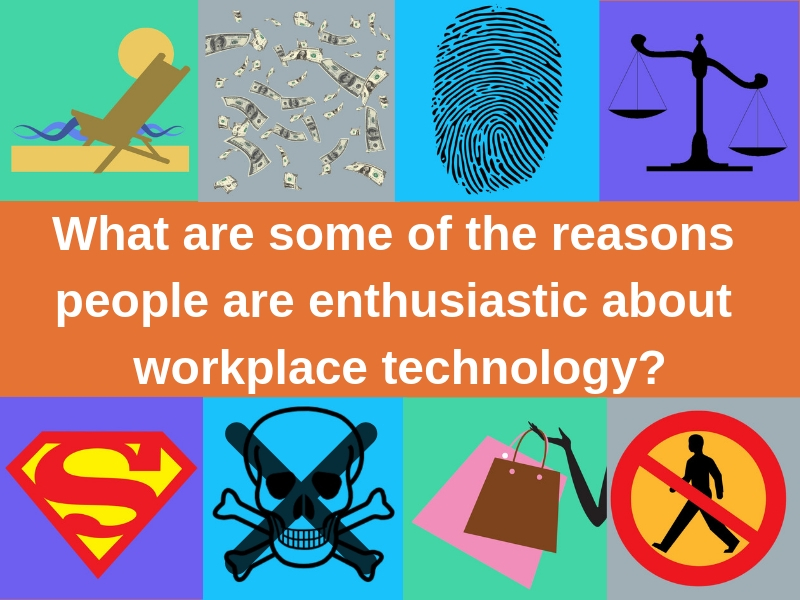
More money
Technology, by economists' definition, ups productivity. Improved productivity (getting more outputs from your inputs) is closely linked to improved profits. Profits are obvs good for companies, but that money could also be passed onto workers, through higher wages, or paid to the government, through taxes, which are then spent on things most of us like: roads, school, hospitals etc.
Makes us better workers
Some people think that technology can improve our skills and teach us how to maximise our personal productivity. If that helps us score pay rises and promotions, technology could be a route to more money (which most people think improves their quality of life). Plus, we all like being good at stuff so anything that makes us feel like a success is good for our wellbeing.
Makes stuff cheaper
If technology lets businesses create things for much less money than before then companies might lower the price of their product or service. (This is what happened with cars, after Ford made use of the assembly line to make a much more affordable vehicle.) That would benefit poorer people the most - they could afford new things and their income would also go further
Takes over dull or dangerous tasks
Lots of jobs that humans need to do are incredibly dangerous - think clearing landmines or handling toxic waste. And often, dangerous work is foisted off on the poorest and most vulnerable. Sending tech in instead can save people's lives and health. And lots of people are excited that technology could replace tasks that are really, really boring, freeing up more time for us all to do funner stuff.
Make workplaces safer
Some people point out that knowing exactly who is in a workplace and controlling their access around the building can make everyone safer, stopping everything from stalkers (16 percent of US women have had one) to terrorist attacks. They also say that monitoring people can also stop confidential information falling into the wrong hands, and alert people to any potential danger or problem quickly.
Reduce bias
Humans are notoriously unfair in their judgements. Lots of people say that as tech doesn't have the same foibles as humans it could help prevent unconscious bias in hiring (where rich white men are favoured over equally qualified candidates) and combat things like conformity bias (groupthink, basically) which can lead to work mistakes or bad practices.
Less work for everyone
If technology takes over a lot of our work tasks and ups production, lots of people, including Britain's biggest trade union, think we could all end up being paid the same amount of salary but work much shorter days or weeks. (John Maynard Keynes said this would be an economically savvy idea over 50 years ago). And giving people more time to enjoy themselves and less time at work would probably be popular!
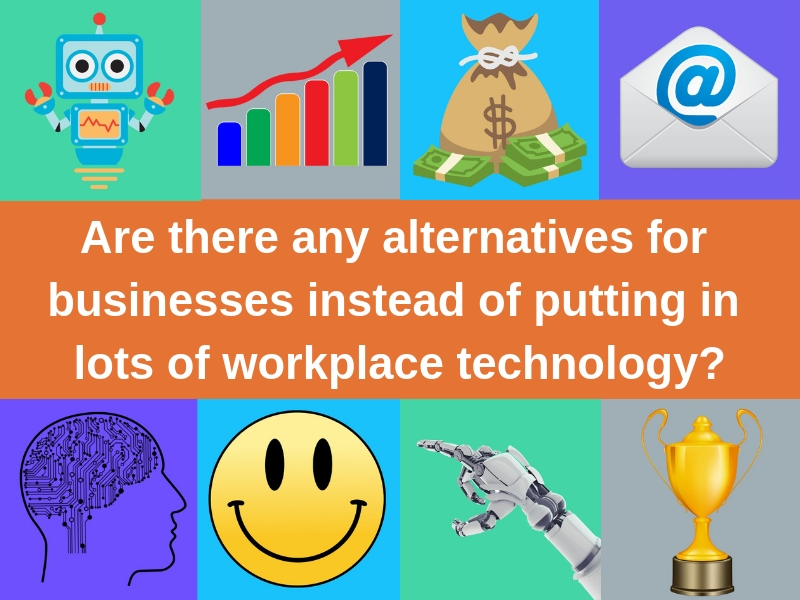
Maximise labour productivity:
In normal-speak, get the most out of the staff. How could businesses do this?
(1) They could go down the route of chaining staff to their desks for twelve hours a day (hey, more work hours = more work done, right?)
(2) They could follow the extensive amount of research (https://www.fastcompany.com/3048751/happy-employees-are-12-more-productive-at-work) that suggests treating people well massively ups their productivity. That means paying them good wages, cutting down their work hours, training them properly, and so on.
Shift focus from productivity to sustainability:
Lots of people are starting to get really really worried about what our obsession with producing more and more stuff is doing to the environment.
Most businesses can only grow by taking more stuff from the environment (from fossil-fuel energy to keep office lights on, to concrete to build new factories, to paper to print reports on). And persuading people to keep buying new stuff from businesses often means persuading them to get rid of the stuff they already own (which, historically, we've not been very good disposing of in an environmentally friendly way).
So instead of trying to produce more and more stuff, perhaps businesses should focus minimising their environmental footprint.
But what do you think?
